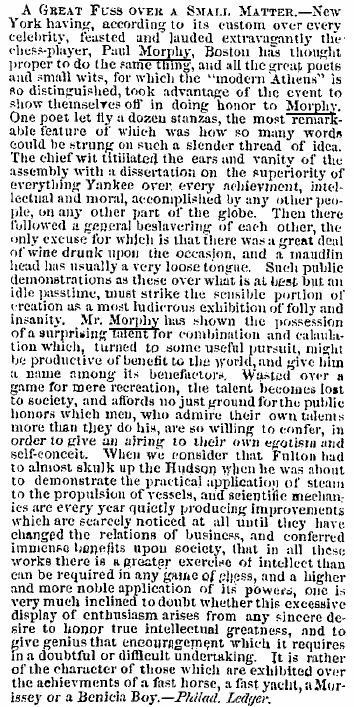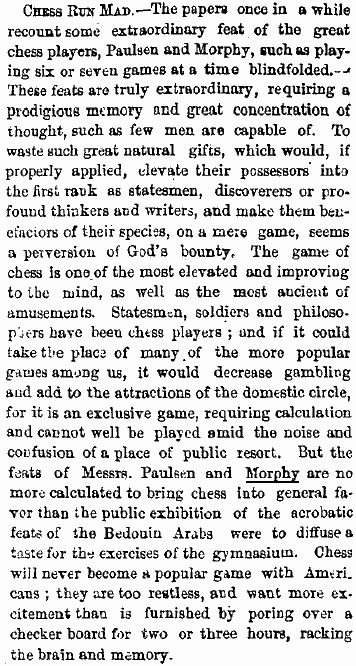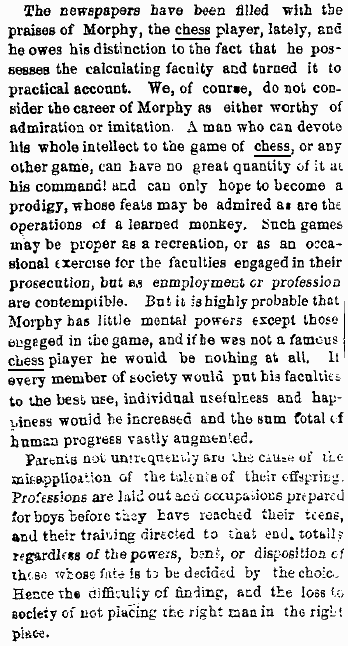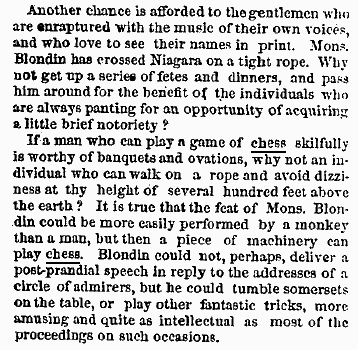|
The United States has always had a peculiar attitude towards
chess.
The ability to play chess was a mark of a gentleman in early
America and men such as
Ben Franklin , who in his capacity as the U.S. Ambassador to France had
the opportunity to play chess both in the Café de la Regénce and in many a
Lady's chambers. He also wrote a most famous treatise on the
Morales of Chess, outlining all
the positive benefits one may receive from playing the game.
Thomas Jefferson, as Minister to France, also played at the Café
de la Regénce where he learned that the dilettante style of chess to which he
was accustomed wouldn't survive long against the rough and tumble players in the
Regénce.
"I have heard him [Jefferson] say that when, on his arrival in
Paris, he was introduced into a Chess Club, he was beaten at once, and that so
rapidly and signally that he gave up all competition. He felt that there was no
disputing such a palm with men who passed several hours of every evening in
playing chess."
Jefferson often passed the time playing chess with his close
friend, James Madison.
Chess was also a proper diversion for military leaders: George Washington,
Winfield Scott, Robert E. Lee and
Hiram Ulysses Grant all played chess.
There were very few professional players in early America. One
who stood out was
William Schlumberger, an Alsatian who was America's best player between 1826-1837
and who earned 4
francs per day giving lessons in Paris where he also taught Saint-Amant the game.
After moving to America, Schlumberger became an operator (the last one, in fact)
of the Turk. After Schlumberger, Charles Henry Stanley
became as close to being a chess professional, making his living in part with
chess periodicals and chess columns. Neither Schlumberger nor Stanley were rich,
aristocratic or intellectuals. But Stanley played Eugène Rousseau, who
was a well-bred amateur and member of the New Orleans chess club, for publicly
acclaimed title of
U. S. Champion. Winning the title and the $1,000 purse (the same amount
that Fischer would receive 115 years later for winning the same title), Stanley
was a very popular chess figure. But by and large, professionalism in chess was
frowned upon. In just 12 more years, Paul Morphy, from the same New
Orleans chess club as Rousseau, would usurp the title from Stanley and go on a
chess frenzy that would last for a little over a year and abruptly end partly
because the idea of being considered a chess professional was too distasteful.
Unlike other forms of competition, the public had a hard time
seeing chess as a sport. It was perceived as a game, perhaps one of the highest
order, but still a mere game. Despite the fact that the
1st American Chess Congress was one of the
first organized competitions of any magnitude in the United States, it never
struck a responsive chord with the general population. Although Morphy, through
chess, represented the United States elegantly, eliciting admiration wherever he
went and spotlighted the intellectual growth and achievements in a country that
had continually been looked down upon as second class by it's European
forbearers, many people and a lot of the press saw him in a much different light:
|
June 6, 1859
 |
March 24, 1858
 |
| Feb 7, 1859

|
July 2, 1859

All the articles had been published in the
Brooklyn Daily Eagle |
|

